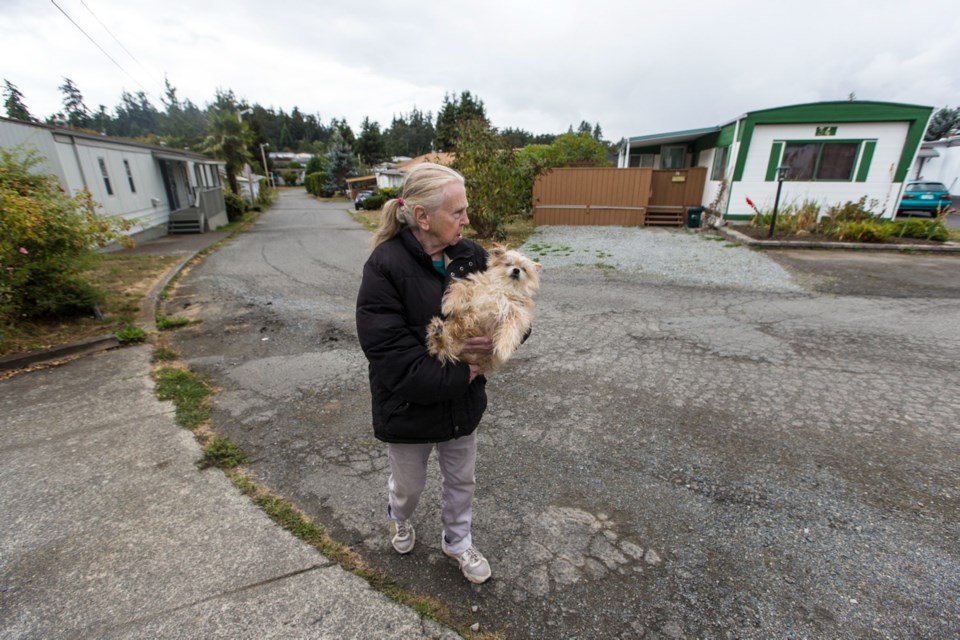Residents of a mobile home park on Songhees First Nation land that is poised for redevelopment are distraught and uncertain about their futures after receiving eight months’ notice to leave.
The First Nation, citing a severe housing shortage, plans to build 180 rental units in four buildings on land at Triple Oaks mobile home park, 1309 Craigflower Rd.
Rose Cross, 73, who lives with five family members in a double-wide mobile home, said: “It was quite a shock when this happened.”
All 41 mobile homes at the site are privately owned. Their owners are tenants, paying a monthly rent of up to $400 for the pads their homes sit on.
Many residents are seniors with limited pensions, Cross said. It will be difficult to find an apartment in the capital region and even then, the rent is “too high.”
Greater Victoria’s residential rental vacancy rate is a tight 0.5 per cent.
The project comes as the Songhees First Nation works toward more economic independence and development. Band members living off-reserve want to live on Songhees land.
“We have a severe shortage of housing,” said Songhees executive director Christina Clark.
Mobile-home parks on Songhees land are a legacy from the 1960s, when developers installed infrastructure. There are about 17 private businesses running mobile-home parks on Songhees land, Clark said.
Triple Oaks land is held under a certificate of possession by a band member. The lands have been passed through generations of families.
Tenants are aware of the unsecured nature of their rental agreements, says a statement from Songhees First Nation. “The majority of these mobile homes are over 50 years old and the infrastructure upon which they rely is also at risk of failing,” it says.
“Triple Oaks tenants 65-plus are paying below-market taxes [approximately $100 per year] — that means that occupants of a member business are being subsidized by Songhees Nation to provide services.”
A total of 2,000 tenants live on Songhees land, Clarke said. Songhees membership is at 650, with about 300 people living on the reserve.
The eviction illustrates the vulnerability of mobile home residents who are month-to-month tenants. Some at Triple Oaks have spent more than $100,000 to buy a mobile home, and are carrying loans.
Many homes are well cared for and have been altered to serve as permanent residences.
It’s uncertain whether homes could withstand a move, even if their owners could afford it.
Toby Baker, president of TribeWorks Creative of Vancouver, is working on the transition with Caroline Morris, who holds the certificate of possession for the site.
“The business does not work and she is needing to wind it down,” Baker said.
He said they are helping residents to find housing resources. “We want to do this with them so they don’t feel alone. … We have loads of empathy.”
No compensation is available for the mobile homes, Baker said.
The land is in a development zone permitting multi-family use. Construction could start in May, with the first phase ready for tenants in 2019, Baker said.
Once residents have left, decisions will be made on how development proceeds, he said.
Robert Chirrey owns a mobile home at Triple Oaks with wife Theresa Smith, who is Rose Cross’s daughter.
He fears the eviction means the couple “just lost our life savings.”
They purchased the mobile home eight years ago for $155,000, on the understanding that the situation would remain the same, he said.
Moving the mobile home could cost tens of thousands of dollars, he said.
Chirrey pointed to one mobile home at Triple Oaks where a 93-year-old woman lives. Another one was purchased by a father for his daughter, who is disabled. One was bought with its owner’s inheritance. One woman spent $180,000 on a home and is carrying a $100,000 loan.
Chirrey said he has been talking to other residents.
“I just want to see what I can do for them. It is brutal.”



